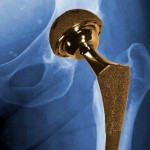
A story in the New York Times says Johnson & Johnson recalled the device, made by subsidiary DePuy Orthopaedics, in 2010. Yet even as the company was preparing the 2011 report, it was publicly downplaying other studies that reached the same conclusion about the all-metal hip implants’ high failure rate.
The all-metal hip implant features both a ball and socket coated in a mixture of cobalt and chromium. It was initially marketed as a more durable alternative to models that incorporated plastic or ceramic.
But in addition to the high early failure rate, another persistent problem for the all-metal models has been their tendency to shed metallic debris in patients’ bodies, damaging tissue and bone.
According to the New York Times, the company’s analysis also says the devices are likely to fail in thousands more patients over the next few years.
DePuy has offered to pay for replacement costs. But thousands more patients have sued for damages related to the pain and trouble they’ve suffered. The story says that about 93,000 patients worldwide have received the implant. About one-third of them are in the United States.
You should consult with a doctor if you have any ongoing symptoms or health concerns from a DePuy hip implant. If you have significant injuries, you should also consult with a DePuy hip lawyer to discuss your legal rights.
See the story here:
